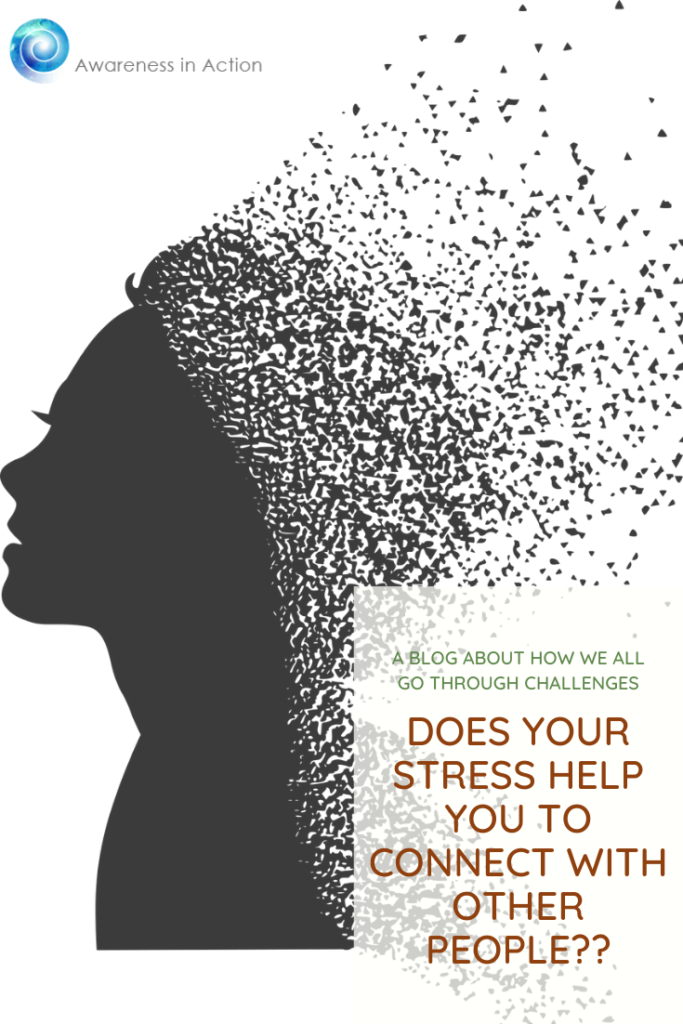My niece is stressed at the moment because she has an end-of-year presentation for her PhD. My neighbour has been stressed for some time because she has a mysterious leak in her shower, which the plumber has so far been unable to fix. A colleague of mine is on extended sick leave due to high blood pressure and has been told to avoid anything likely to cause her stress. My friend had a headache for three days because he was stressed with over-work.
Divorce, bereavement, moving to a new house and even going on holiday all rate high in the stress scale. Troubles at work, economic instability and unemployment are also possible sources. We can even feel stress if caught in traffic or standing in a slow-moving queue at the airport. When we worry about our families, our health, our job, our weight, we are creating scenarios in the mind that can create stress. A short-term physical crisis, such as falling over or scalding an arm can be termed stressful, as can longer-term physical challenges like facing chronic illness or disability.
What is stress?
We use the word ‘stress’ to cover a multitude of experiences—things we are afraid of, things we don’t like, feelings we have, worries that plague us—we refer to all of them as stress. So, we find ourselves using stress to describe moods we have, sensations in our bodies, our reactions to events around us, things happening to us, or things we are worried will happen to us.
In fact, our stress response evolved to help us avoid threat and survive as a species. Our bodies respond to stress in much the same way as any other mammal. However, the way this works in modern life it is not so simple. We subject ourselves to low grade stress for long periods of time. This means that our bodies are continuously being subjected to all the effects of the stress response even when we do not need it.
We get stressed by the very things we created in order to make our lives easier. When my internet goes down it drives me crazy. If I have computer trouble it feels, it can cause stress.
Having a flat tyre is not usually a life-threatening situation and yet it can cause our stress to erupt. Once we have got upset, it is hard to find our off switch and reset. The stress tends to rumble on. Any other mammal experiencing a stressor being removed simply returns to its normal activity. If a zebra escapes from the lion who is trying to eat it, it just goes back to grazing.
On top of that, as humans we have the capacity to think, imagine, and project. No zebra would understand how anyone could lie awake at night worrying about a presentation that they have to make at work the next day. When we worry, we are causing ourselves stress about stuff that might not ever happen.
How we react
We can also help ourselves by looking more closely at what is going on for us when we talk about being stressed. Often we say we are stressed when things are simply not going the way we want them to—we just miss the bus we were running for, the person before us in the supermarket picks up the last loaf of our favourite bread, a colleague at work does not perform how we think they should.
Of course, all these things can be annoying, but we can tip them over into stressful situations by how we react. If we shrug and look for the next bus coming along instead of cursing the driver for not waiting for us; if we mentally offer the bread to the person who got there first instead of resenting them and if we take the time to talk to our colleague to find out why their performance is under-par we can things on a manageable level and avoid a full-stress impact.
There is a Buddhist teaching about two arrows. It describes how when something difficult happens we suffer and feel pain, as if being shot by an arrow. That in itself is intense enough but then we often react to what is happening by complaining, blaming, or hitting out. The pain that this causes us is like being shot by a second arrow. Maybe we cannot avoid the first one, but we do have some choice about the second one.
Stress is inevitable
Hans Seyle, the father of stress research, once said that if you do not experience stress, you must be dead! We know that life is full of challenges. Some are huge and seem overwhelming. Many are small and relatively unimportant in themselves but can add up to a lot of hassle. Training ourselves to accept this, rather than fight it is can be a big help in working with stress.
Meditation can help with this. It helps us become more present, which cuts our habit of ruminating over our worries. Our perspective opens up and we are less likely to take things so personally. Through meditation we can build resilience and learn to how to come back more quickly from a difficult experience.
We can also learn to be more kind to ourselves and stop beating ourselves up about things that go wrong. Telling ourselves off for finding things hard is certainly being hit with two arrows, instead of just one.
Understanding the stress of other people
When we can take a look at how we react, as well as beginning to accept the inevitability of stress it opens up some space. Then we can look around us and see how stress affects other people.
Maybe we find ourselves having to drop into our local super-market on the way home from work. If we take the time to look around us as we push our trolleys through the laden shelves, it is not hard to find opportunities to observe many of the ways we human beings experience stress.
Consider the middle-aged man in a smart suit buying an easy-to prepare meal for one. Perhaps he is recently divorced, living alone for the first time in years and dealing with the stress of change and upheaval. Spare a thought for the young mother with a baby in a buggy and a toddler clinging round her legs. She looks as if she has not had a propernight’s sleep for two or three years. The lounging teenage boy sulking around the soft drinks has an air of aimlessness and boredom about him. Maybe because he left school with such high hopes and now does not seem to be able to find any kind of job that lives up to his dreams. Take care as you pass the older woman, walking carefully, who underwent major surgery two months ago and is feeling low and vulnerable as she tries to get her strength back.
Recognising our shared humanity
As we select the items, we need to cook our evening meal, perhaps we are rubbing shoulders with people suffering from exam nerves, having relationship problems, shouldering the care of elderly relatives–the list is endless.
If we can create space around our own stress, it enables us to see more clearly what is going on for other people. Recognising stress in other people brings home how we are all in the same boat. Whatever our differences, we all just want to be happy and avoid suffering and pain. Yet we know that life brings challenges that we all need to face from time to time.
When we allow ourselves to take account of the difficulties other people face, it opens our hearts. Instead of being focused on our own problems we find room for concern for those of other people. We feel more connected with others and less likely to isolate ourselves with our own worries.


You might be interested in this new zoom+online course which starts on 15 June 2021 HOW DO YOU WANT TO FLOURISH IN YOUR RIPE OLD AGE?
Awareness in Action is dedicated to building a community of people interested in living a life of meaning and purpose based on sustainable wellbeing. If you would like to join with us, you could make a start by sharing and commenting on the ideas you find in the blogs on these pages. Your story is part of our journey.

